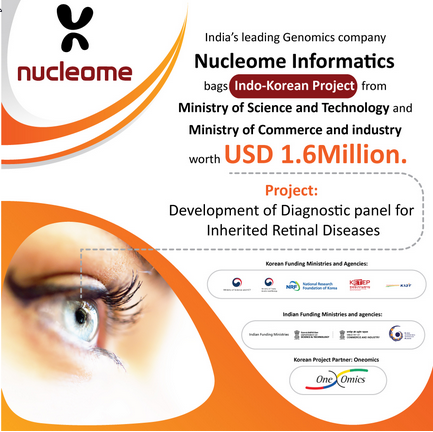New Delhi, September 09,2024 :
Nucleome Informatics, a leading genomics services provider, is proud to announce the launch of its DrSeq IRD panel, a revolutionary genetic test for diagnosing Inherited Retinal Diseases (IRDs). This test is among the most comprehensive available globally, designed to improve early detection and disease management, especially in individuals with a family history of blindness. IRDs represent a genetically diverse spectrum of disorders that affect the retina, leading to vision impairment or blindness.In India, the prevalence of IRDs ranges from 1 in 350 to 1 in 2000, varying by region and factors such as consanguinity. Accurate diagnosis of these conditions has been challenging due to their clinical and genetic heterogeneity, with over 300 genes associated with IRDs. However, most cases are caused by mutations in 20 key genes. Nucleome’s DrSeq IRD panel covers an extensive range of IRDs, including:
● Leber Congenital Amaurosis (LCA)
● Cone Dystrophy
● Cone Rod Dystrophy
● Retinitis Pigmentosa (RP)
● Stargardt's Disease
● Maclaren Dystrophy
● Congenital Stationary Blindness
● Vitelliform Macular Dystrophy
● Bardet-Biedl Syndrome
● Usher Syndrome
● Choroideremia
● Achromatopsia
● Bestrophinopathy
● Leber Congenital Amaurosis (LCA)
● Cone Dystrophy
● Cone Rod Dystrophy
● Retinitis Pigmentosa (RP)
● Stargardt's Disease
● Maclaren Dystrophy
● Congenital Stationary Blindness
● Vitelliform Macular Dystrophy
● Bardet-Biedl Syndrome
● Usher Syndrome
● Choroideremia
● Achromatopsia
● Bestrophinopathy
The DrSeq IRD panel includes 850 genes and thousands of known and novel variants, providing superior diagnostic accuracy. The test helps identify the genetic mutations responsible for specific IRD types, which is critical for tailoring treatment options, including gene therapy. The significance of genetic testing is growing as gene therapies advance. These tests enable patients to qualify for clinical trials or access targeted treatments tailored to their genetic profiles.
In collaboration with LV Prasad Eye Institute (LVPEI), DST (Department of Science and Technology) of the Government of India and Korean partners, including Seoul Eye Hospital, Nucleome Informatics has developed the DrSeq IRD panel by sequencing 300 IRD patients and 200 healthy family members from India. A similar study was conducted using Korean patient samples, further validating the panel’s efficacy across populations. One of the unique aspects of the DrSeq IRD panel is its saliva-based collection method, which eliminates the need for blood samples. Patients can easily provide samples from the comfort of their homes using a saliva collection kit, which will be analyzed at Nucleome's state-of-the-art laboratory in Hyderabad.
Mr. Dushyant Singh Baghel, CEO of Nucleome Informatics, announced the launch of this innovative test during his participation in a conference at Stanford University, San Francisco. Mr. Baghel expressed his excitement about making the test available in India and shortly globally. He said, “The DrSeq IRD panel marks a significant step forward in tackling the challenges posed by Inherited Retinal Diseases. With this test, we aim to enhance early detection, improve treatment options, and support gene therapy initiatives worldwide. Nucleome Informatics is actively seeking distribution partners globally, as well as gene therapy companies that are targeting IRDs such as Leber Congenital Amaurosis, Stargardt’s Disease, Retinitis Pigmentosa, and other conditions covered by the DrSeq IRD panel”.
The company extends its gratitude to the Technology Development Board, DST, Government of India, LV Prasad Eye Institute, and Korean counterparts for their support in making this project a reality.

 The company extends its gratitude to the Technology Development Board, DST, Government of India, LV Prasad Eye Institute, and Korean counterparts for their support in making this project a reality.
The company extends its gratitude to the Technology Development Board, DST, Government of India, LV Prasad Eye Institute, and Korean counterparts for their support in making this project a reality.










.jpeg)











.jpg)








